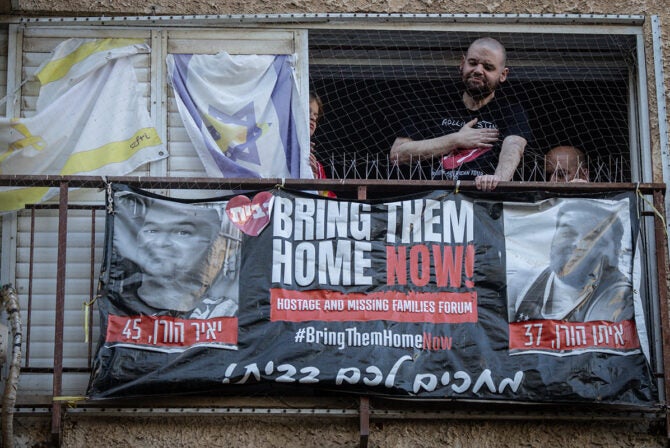This post is part of our month-long series featuring different ways that parents of various religions have talked to their kids about God.
When people ask what religion we are—me, my husband Justin, and our two small children–I answer, “nothing.”
Then I realize how empty this sounds. I revise, explaining our parents’ religion. As if, to tell the whole truth, one has to start from the beginning.
My Catholic parents believe even dogs go to heaven, I say.
Justin’s parents, I add, are atheists who belong to a temple of socially conscious activists, presided over by a gay rabbi.
Justin and I do not believe in God, but he can still call himself Jewish. It is ingrained in his history, his perspective, his sense of humor, and even his curly hair, which he calls a Jewfro. I will only ever call myself an ex-Catholic, because once I stopped believing in God, in Jesus, in his mother Mary, in miracles and the afterlife, calling myself a Catholic felt like trespassing.
Despite our attachments to the religious identities of our parents, Justin freely admits that he is an atheist. But I often feel I have to elaborate after I confess my loss of faith. “I used to believe. If I could, I would.”
I need people to understand that it’s not my choice, and that I know life would be easier, and less lonely, if I did still believe. My people, for generations back on both sides, are believers. I am the first to not baptize his or her children. My nightly prayers as a child, my visits to the confessional box, the papery taste of the crumbling communion wafer on my tongue–all feel as if they happened to another person, not me.
Death is mentioned regularly in our house–but only in regards to the death of LEGO figurines and Power Rangers. Our 6-year-old son says, “The bad guy got dead!” or “Batman made the Joker dead!” but it has the weight of losing a life in a video game. Getting dead = Game Over. You can start over. Reboot. Try again. The few times that death, with a capital D, has come up have been (coincidentally?) at my parents’ house. Like when my son spotted the black-and-white photos of my deceased Italian ancestors crowding the mantel, flanked by holy candles, a chipped statuette of St. Francis standing guard.
Then, this past Christmas, my son hung an ornament shaped like a German shepherd on the tree.
“That was our doggie,” my mom explained.
“But where is she now?” my son asked.
“She’s in heaven,” my mother said, knowing I would roll my eyes (animals in the afterlife?), knowing I would add, “That’s what Nanny and Nonno believe.”
My son clutched the ornament to his chest, which he’d insist on bringing home. “You mean she’s gone?” Panic lined his voice.
For now, he hasn’t taken the next step. He hasn’t asked–Where did she go? And while we haven’t had to say much about death to our happy-go-lucky first child, I expect we’ll be turning that corner soon, as his 3-year-old sister’s favorite question is already–
why
?
No matter how much I’d love to tell my children that there is always a happy ending, I can’t tell them a story I don’t believe in. Faith was a precious relief in my own anxious childhood–as was the certainty that there was a beautiful and, more importantly, safe place like heaven, no matter what your earthly life. The rituals of prayer, and its accessories–rosary beads, the plastic-framed picture of a benevolent Jesus over my bed, my collection of Virgin Mary statues and the silver crucifix I wore around my neck–were amulets against the danger I felt lurking everywhere, which would, decades later, be diagnosed as Obsessive-Compulsive disorder.
Still, the loss of that faith was traumatic. It started in my college religion courses, and continued as psychology became my new religion and the filter through which I made sense of myself and the world. Justin mourns the fact that he wasn’t taught to believe in God, although he did attend Jewish preschool and have a bar mitzvah. He blames his own anxiety as a child on his precocious understanding of death. There is a story he tells to illustrate this. He begged his mother to take him to a cemetery (he was 7). When she explained there “wasn’t enough room for everyone to live forever,” he suffered a panic attack that ended with his proposition that they “build taller buildings.”
We used to debate whether it was worse to have faith and lose it, or to never know it at all. The debate is no longer relevant because it is clear that as we’ve grown as a couple, become parents twice-over, surpassed challenges in our careers, in our relationship, and in our children’s lives, we have become more faithless. But only in our faith in God. We’ve become more faithful to our belief in, and practice of, family. The conception and birth of a baby, and the moment-to-moment bustle specific to parenting young children, is a constant reminder that life is an act of faith. I wonder, sometimes, if I live each moment more fully than my parents because I believe this life, and every moment I have to stare at my children’s smiles, is all I will ever have.
Julia‘s debut novel, Cutting Teeth, about the complex (and often comical) experience of modern parenting, will be published by St. Martin’s Press in March 2014. She is the founder of the Sackett Street Writer’s Workshop.
To read all of the post in this series, click here.








